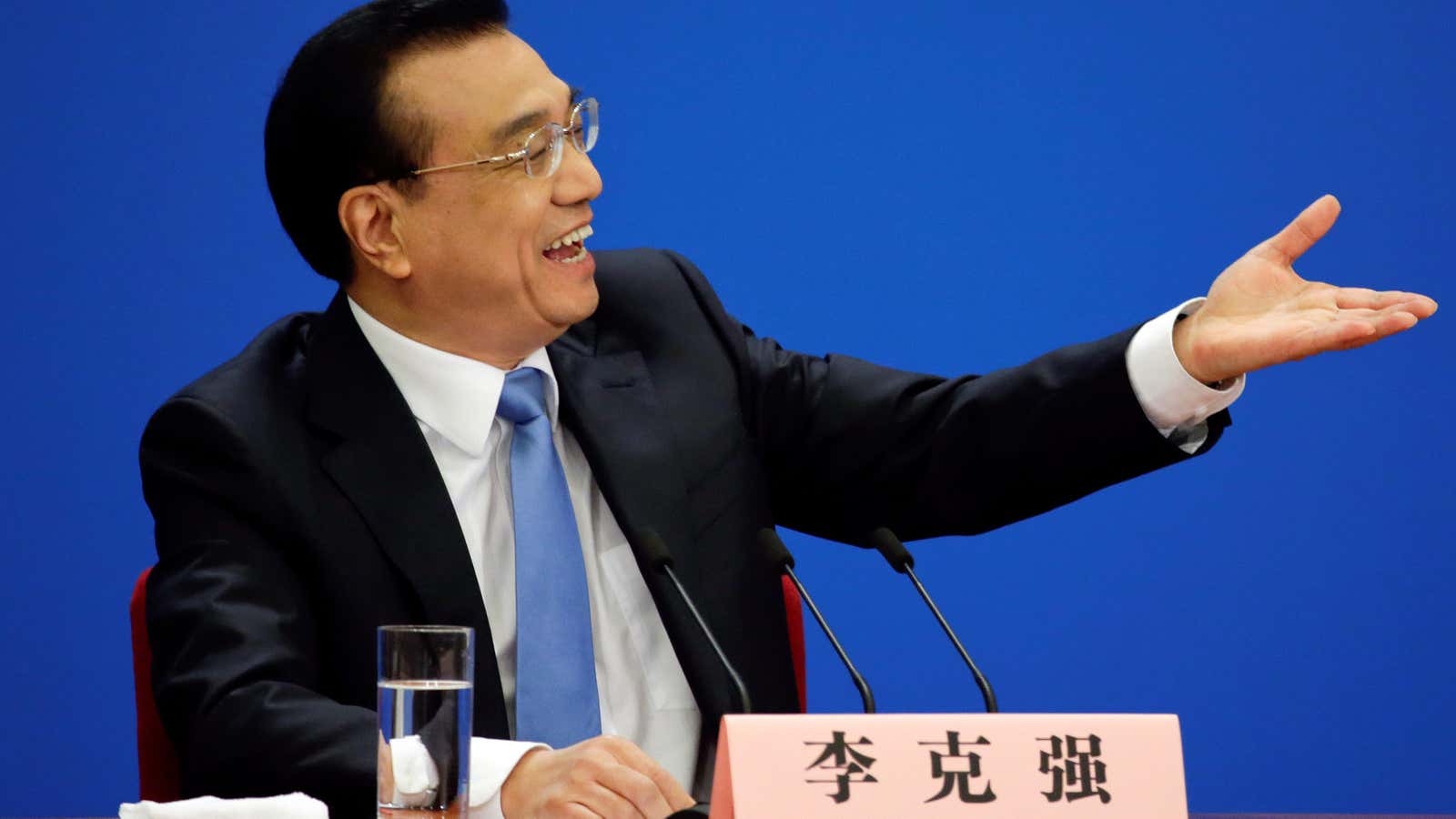US president Donald J. Trump’s antagonism toward the press has been extraordinary, as was his notorious denunciation of five news organizations as “the enemy of the American people” (including CNN and the New York Times).
His belligerence toward major outlets has created an opportunity for China’s leaders to offer up a contrasting, seemingly more open style—however misleading that is. The change could be felt today at the Communist Party’s biggest press conference of the year, which follows the just-concluded two-week National People’s Congress in Beijing and usually lasts a few hours. For many journalists it’s the only chance to get something close to a real answer from a top Chinese official.
China’s premier, currently Li Keqiang, typically fields the questions. Li gave CNN the prized first question.
“President Trump has consistently criticized China for stealing US jobs, manipulating currency exchange, and not doing enough to maintain regional security… What do you expect to receive from the US, and vice versa?” asked the network’s reporter.
Li’s answer, which lasted for about 10 minutes, pretty much stuck to the script. He noted that Trump agreed to honor the “One China” policy—deemed by Beijing as the political foundation of the US-China relations—after a phone call last month with his Chinese counterpart Xi Jinping. As to the other issues, Li said, the two sides will “continue talking, which is what wise people do.” (Xi is scheduled to meet with Trump next month in Florida.)
It’s worth noting that Chinese authorities pre-approve every question asked during the big press conference. Foreign journalists, in particular, must submit questions in advance and often must negotiate the wording with officials, a tedious process that can last for days. Sneaky questions occasionally get through, but usually everything said during the proceeding is bland and pre-approved.
Still, there have been changes to the conference. After Xi and Li assumed their current positions in early 2013, the Chinese government became friendlier to international media. Li has picked foreign journalists to ask the first question every year. That’s in stark contrast to previous Chinese administrations, which typically gave the first crack to party-controlled media such as the Xinhua newswire or the People’s Daily newspaper.
Here’s a list of the first questions Li granted in the past five years:
- 2017: CNN on US-China relations
- 2016: Reuters on China’s stock and currency markets
- 2015: The Financial Times on China’s property market
- 2014: CNN on the missing MH370 Malaysia Airlines plane
- 2013: Singapore’s Lianhe Zaobao newspaper on government reforms
And here’s how that compares to the first questions given during the second term of previous premier Wen Jiaobao:
- 2012: Xinhua on Wen leaving the post
- 2011: The People’s Daily on the government’s annual GDP target
- 2010 The Financial Times on China’s monetary policy
- 2009: China Daily on the global financial crisis
- 2008: Phoenix TV (a pro-Beijing station in Hong Kong) on Wen’s challenges in the second term
One of Li’s favorite moves has been to marvel at the language skills of foreign reporters who ask their questions in Mandarin. It offers a rare bit of spontaneity to the otherwise highly scripted proceedings. “Where did you learn Chinese? Your Mandarin is so good,” he told a Nikkei reporter today. And to a Russian journalist he said, “You have great courage to ask all of the question in Chinese.”
The improving tone in Beijing contrasts with the worsening one in Washington. Last month Trump’s press secretary, Sean Spicer, barred several outlets from an off-camera briefing, presumably as punishment for their reporting on Trump’s alleged links to Russia. Among them was CNN, which Trump called the “Clinton News Network.” Meanwhile Spicer routinely skips over established reporters from the Associated Press and major TV stations, instead taking softball questions from right-wing news sites.
This year Li not only started off with CNN, but also took an unprecedented nine questions (nearly half of the total) from foreign outlets, including Bloomberg, Reuters, and Nikkei.
Of course, China is hardly a champion of press freedom; in fact, the exact opposite seems to be the case. But at least on the surface, Beijing is positioning itself as friendly to reporters while Trump is lambasting their employers.
